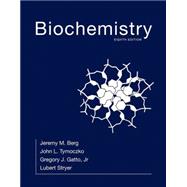With a a signature emphasis on physiological and medical relevance, Biochemistry incorporates exceptionally clear writing, innovative graphics, and coverage of the latest research techniques and advances to help you grasp content.

Note: Supplemental materials are not guaranteed with Rental or Used book purchases.
Purchase Benefits
With a a signature emphasis on physiological and medical relevance, Biochemistry incorporates exceptionally clear writing, innovative graphics, and coverage of the latest research techniques and advances to help you grasp content.
JEREMY M. BERG received his B.S. and M.S. degrees in Chemistry from Stanford (where he did research with Keith Hodgson and Lubert Stryer) and his Ph.D. in Chemistry from Harvard with Richard Holm. He then completed a postdoctoral fellowship with Carl Pabo in Biophysics at Johns Hopkins University School of Medicine. He was an Assistant Professor in the Department of Chemistry at Johns Hopkins from 1986 to 1990. He then moved to Johns Hopkins University School of Medicine as Professor and Director of the Department of Biophysics and Biophysical Chemistry, where he remained until 2003. He then became Director of the National Institute of General Medical Sciences at the National Institutes of Health. In 2011, he moved to the University of Pittsburgh where he is now Professor of Computational and Systems Biology and Pittsburgh Foundation Chair and Director of the Institute for Personalized Medicine. He served as President of the American Society for Biochemistry and Molecular Biology from 2011-2013. He is a Fellow of the American Association for the Advancement of Science and a member of the Institute of Medicine of the National Academy of Sciences. He received the American Chemical Society Award in Pure Chemistry (1994) and the Eli Lilly Award for Fundamental Research in Biological Chemistry (1995), was named Maryland Outstanding Young Scientist of the Year (1995), received the Harrison Howe Award (1997), and received public service awards from the Biophysical Society, the American Society for Biochemistry and Molecular Biology, the American Chemical Society, and the American Society for Cell Biology. He also received numerous teaching awards, including the W. Barry Wood Teaching Award (selected by medical students), the Graduate Student Teaching Award, and the Professor’s Teaching Award for the Preclinical Sciences. He is coauthor, with Stephen J. Lippard, of the textbook Principles of Bioinorganic Chemistry.
John L. Tymoczko is Towsley Professor of Biology at Carleton College, where he has taught since 1976. He currently teaches Biochemistry, the Metabolic Basis
of Human Disease, Oncogenes and the Molecular Biology of Cancer, and Exercise Biochemistry and co-teaches an introductory course, Energy Flow in Biological
Systems. Professor Tymoczko received his B.A. from the University in Chicago in 1970 and his Ph.D. in Biochemistry from the University of Chicago with
Shutsung Liao at the Ben May Institute for Cancer Research in 1973. He then held a postdoctoral position with Hewson Swift of the Department of Biology at
the University of Chicago. The focus of his research has been on steroid receptors, ribonucleoprotein particles, and proteolytic processing enzymes. Gregory J. Gatto, Jr., received his A.B. degree in chemistry from Princeton University, where he worked with Martin F. Semmelhack and was awarded the Everett S. Wallis Prize in Organic Chemistry. In 2003, he received his M.D. and Ph.D. degrees from the Johns Hopkins University School of Medicine, where he studied the structural biology of peroxisomal targeting signal recognition with Jeremy M. Berg and received the Michael A. Shanoff Young Investigator Research Award. He then completed a postdoctoral fellowship in 2006 with Christopher T. Walsh at Harvard Medical School, where he studied the biosynthesis of the macrolide immunosuppressants. He is currently a Senior Scientific Investigator in the Heart Failure Discovery Performance Unit at GlaxoSmithKline.
Part I THE MOLECULAR DESIGN OF LIFE
1. Biochemistry: An Evolving Science
2. Protein Composition and Structure
3. Exploring Proteins and Proteomes
4. DNA, RNA, and the Flow of Genetic Information
5. Exploring Genes and Genomes
6. Exploring Evolution and Bioinformatics
7. Hemoglobin: Portrait of a Protein in Action
8. Enzymes: Basic Concepts and Kinetics
9. Catalytic Strategies
10. Regulatory Strategies
11. Carbohydrates
12. Lipids and Cell Membranes
13. Membrane Channels and Pumps
14. Signal-Transduction Pathways
Part II TRANSDUCING AND STORING ENERGY
15. Metabolism: Basic Concepts and Design
16. Glycolysis and Gluconeogenesis
17. The Citric Acid Cycle
18. Oxidative Phosphorylation
19. The Light Reactions of Photosynthesis
20. The Calvin Cycle and the Pentose Phosphate Pathway
21. Glycogen Metabolism
22. Fatty Acid Metabolism
23. Protein Turnover and Amino Acid Catabolism
Part III SYNTHESIZING THE MOLECULES OF LIFE
24. The Biosynthesis of Amino Acids
25. Nucleotide Biosynthesis
26. The Biosynthesis of Membrane Lipids and Steroids
27. The Integration of Metabolism
28. DNA Replication, Repair, and Recombination
29. RNA Synthesis and Processing
30. Protein Synthesis
31. The Control of Gene Expression in Prokaryotes
32. The Control of Gene Expression in Eukaryotes
Part IV RESPONDING TO ENVIRONMENTAL CHANGES
33. Sensory Systems
34. The Immune System
35. Molecular Motors
36 Drug Development
The New copy of this book will include any supplemental materials advertised. Please check the title of the book to determine if it should include any access cards, study guides, lab manuals, CDs, etc.
The Used, Rental and eBook copies of this book are not guaranteed to include any supplemental materials. Typically, only the book itself is included. This is true even if the title states it includes any access cards, study guides, lab manuals, CDs, etc.